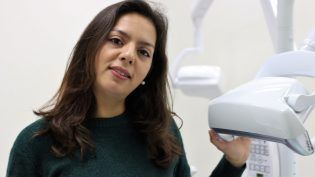Besides being a Dentistry student from Chile, Francisca is a perfectionist who is driven to help other people, wherever they are. This is the kind of person she is and it’s something that really comes through in this interview with her. She tells us all about the adventure she’s been on since August, when she arrived at the University. So, we’ve already said how we see her, but how does she see herself? “Braver than I thought I was”, she says.

You did part of your degree in Chile. How have you adapted to this change in system?
There were three reasons I opted to change university and come here: the international atmosphere, the facilities and the chance to take part in volunteering and cooperation programmes as a student. The change has been all for the better in every sense. Academically, the relationship between the lecturers and students is on a different plane: you can ask about anything you’re not sure about. The lecturers are very helpful and approachable.
Maybe the aim is to resolve any questions students might have before they leave the lecture room.
That’s the key. You learn the most important things in class, but you can even stop lecturers in the corridor, they know your name and are willing to help you there and then. You never get the feeling that you’re putting them out by asking questions. There’s a real commitment from them to convey the course content and ensure that students get the most out of lectures. Their desire to help students feels genuine.
“I NEED TO KEEP THAT CONTACT WITH PEOPLE AND TO GIVE HELP TO WHOEVER NEEDS IT, IN ANY WAY THAT I CAN.”
Have there been any nice surprises?
In terms of practical training, the differences are even bigger. In Chile, the student is the one who has to get out there and find patients. That means that you’re vulnerable to patients cancelling their appointments, and if you don’t reach a fixed number of patients, you can fail the course. Here, there’s less uncertainty because you get your patients through the Faculty’s own clinic, which is a real, functioning organization, with activity every day and routines which are already well established. That provides the stability and certainty you need to learn.
You’ve said that you’d like to participate in the volunteering missions that the University runs.
Helping other people in need is something that I find satisfying. Going somewhere to lend a hand is always going to be an experience with more positives than negatives. Even if the situation is a difficult one or the environment is challenging, the improvement in well-being that you can provide to others trumps that. It’s a great opportunity that the University provides us with and it’s something that doesn’t happen everywhere.
It sounds like sitting in an office in front of a computer all day is not for you.
I need to keep that contact with people and to give help to whoever needs it, in any way that I can. That’s what attracted me first to a career in healthcare. It’s true that I’m not great around suffering, and maybe that’s why I ended up choosing dentistry, a medical profession that’s a bit different.
 What makes it different?
What makes it different?
I think of dentistry as an art. And the patients are people who aren’t usually suffering from something which is life-threatening. I love painting and I like to see the connections between the two worlds: precision, technique and care. A millimetre here or there can change everything. That fits quite well with my tendency to be a perfectionist.
Have you thought about specializing?
I know what I want to do: paediatric dentistry. When I was in Chile, I came into contact with children and I knew that that was for me. By employing a few tricks, and a bit of patience and empathy, providing care to kids can give you a lot of satisfaction. Although I’ve already got some experience, I plan to do the Master’s Degree the CEU UCH offers in this area.
Do you have any advice for those who might be thinking about following in your footsteps and coming over from Chile or elsewhere in Latin America?
Moving abroad will help them to grow. My mum said that it was difficult to see me go, but she wasn’t selfish in that respect. I wouldn’t say coming to a new country on your own is easy, but you learn how to resolve your problems yourself, and you also know that the University is there to support you. You’ve got to take some risks and see what you’re really capable of.
Thanks for this great advice, Francisca, and for the time you set aside to talk to us. Best of luck for the future!









